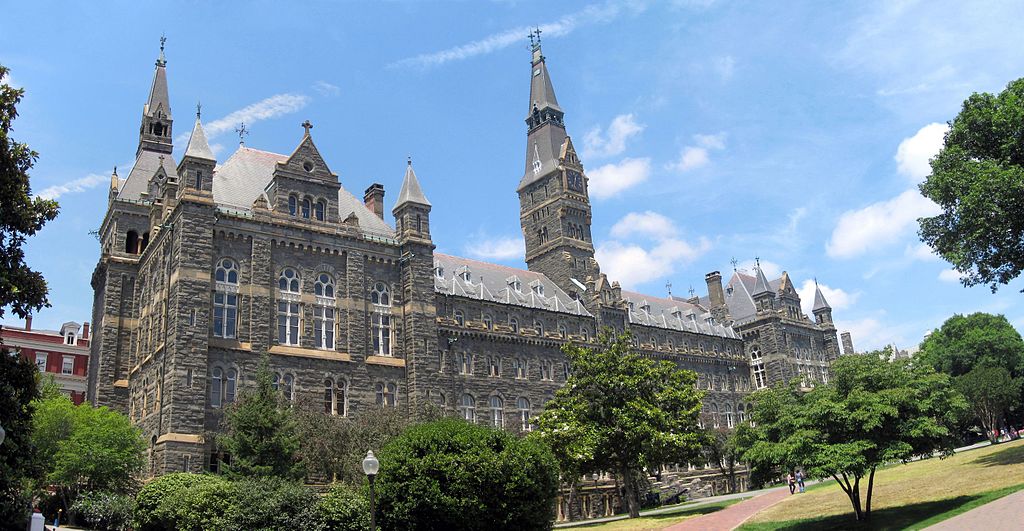Content warning: sexual harassment, sexual assault
Members of the Georgetown community are supporting a petition demanding the university commit to a series of policies supporting survivors of sexual assault and harassment following the U.S. Department of Education’s changes to federal Title IX regulations.
The petition was sent to President John DeGioia on July 22 and has 437 signatures as of July 27, as well as the endorsement of over 30 student organizations. It calls on Georgetown to commit to the petition’s demands by Aug. 1.
Title IX is a federal law that prohibits discrimination on the basis of sex within educational institutions that receive federal financial assistance. Secretary of Education Betsy DeVos announced the changes to the law on May 6 following a widely-criticized preliminary proposal in 2018.
The new regulations redefine sexual harassment from any unwelcome sexual conduct to conduct that impedes a person’s equal access to education. The regulations also limit university liability in investigating incidents of harassment that take place off-campus, give schools the option to use a higher standard of evidence in proving a student’s guilt of harassment, eliminate the requirement that schools adjudicate cases within 60 days, and allow a representative of the accused to cross-examine accusers and their evidence.
DeVos argues these new standards protect the due process rights of the accused and strike a fair balance between the rights of the two parties. However, detractors argue that the regulations harm survivors of sexual harassment and assault by denying their access to a fair Title IX process.
“The Rule contains dangerous provisions that go against best practices, tip the scales against survivors, and jeopardize tens of thousands of students’ civil right to an education free from discrimination,” the petition reads.
One of the writers, Katarina Watson (COL ’21), spoke about specific ways the new regulations could be harmful to survivors. “The definition [of sexual harassment] itself is being limited a lot. It has to be severe and pervasive,” she said. “In one interpretation, you would need not to go to class or leave school, which assumes how survivors are going to react in a given situation.”
Watson also argued that requiring cross-examination could have a chilling effect on students reporting instances of sexual harassment. “People won’t come forward if they know that’s a part of it,” she said.
In response to these issues, the petition makes several demands the writers believe will uphold the rights of survivors. They emphasized that while DeVos’ regulations imposed many new requirements on schools, they also gave schools some room to determine how to implement the changes. The petition asks Georgetown to commit in writing to maintaining its previous Title IX policies and implement new ones in light of the rule changes.
While the new regulations permit schools to use the clear and convincing evidence standard— where guilt is established if evidence proves that a crime was highly probable—they also give schools the freedom to use the preponderance of the evidence standard, which establishes guilt if a claim is more than 50 percent likely to be true.
The petition asks that Georgetown commit to using the preponderance of evidence standard. “Preponderance of the evidence is the only standard that values the education of both complainants and respondents equally,” it reads.
In response to DeVos’ elimination of the 60-day time limit for adjudicating Title IX cases, the petition asks that Georgetown establish a timeline for Title IX investigations, arguing that a set timeframe for investigations would benefit both accusers and the accused.
“Lengthy investigations are emotionally taxing on survivors, often causing students to drop-out before their cases are complete. Drawn-out timelines are bad for complainants and respondents alike, leaving them uncertain of where things stand with their schools,” the petition reads.
The petition also responds to the changed definition of sexual harassment. While DeVos’ changes prohibit off-campus incidents or incidents that happened through study abroad from being adjudicated by the Title IX office, universities can set their own policies for dealing with them. The petition demands that Georgetown provide measures of redress for survivors regardless of where their assault took place and that the university creates a separate sexual misconduct policy to deal with harassment not included under DeVos’ new definition.
Additionally, DeVos’ changes include allowing schools with a religious affiliation to qualify for a religious exemption under Title IX without having to submit a written statement to the Department of Education first. The petition demands that Georgetown pledges not to use religious exemptions to avoid its civil rights obligations under Title IX.
Georgetown has not used religious exemptions under Title IX in the past. However, the petition argues, it is nonetheless important for Georgetown to establish a commitment to not using such exemptions in the future.
“The school’s declaration is that it has never used a religious exemption in the past is not enough; students deserve to know their civil rights are secure in the future, not just that they were in the past,” the petition reads.
Georgetown administrators stated at a July 6 discussion with students they would implement many of these recommendations. Assistant Director of the Office of Student Conduct Heather Kimball explained that Georgetown plans on making only the changes necessary to receive federal funding. “Our approach has been to change as little as possible and to maintain, to the extent we can, the processes that we have in place as we address all misconduct and all sexual misconduct we were previously able to address,” Kimball said.
Specifically, administrators said all conduct that was prohibited under Title IX previously will now be prohibited under the Georgetown code of conduct, Georgetown will continue to use the preponderance of the evidence standard for Title IX cases, and will investigate sexual misconduct remotely during the COVID-19 pandemic. However, the administrators said they were unable to commit to a binding limit of 60 days for investigations because they did not believe the university could conduct thorough investigations within that time period.
The petition authors acknowledged Georgetown made these commitments and explained their reasoning for including them as demands in the petition.
“We recognize that the University has already agreed to some of these items, but we have included them here firstly to ensure that the commitments apply across campuses and secondly to ensure they are clearly communicated to the entire Georgetown community,” it reads.
Other than the demands specifically related to DeVos’ changes to Title IX, the petition makes several additional demands related to Georgetown’s commitment to eliminating sexual violence. The authors demanded the university hires four new CAPS clinicians who specialize in treating Black and Black LGBTQ students; search for a team of responders to sexual violence including a new associate director for Sexual Assault Response and Prevention Services, a specialist in restorative justice, and a gender-based violence specialist; continue providing birth control to students who need it for medical reasons, and adhere to Obama-era guidance on protecting LGBTQ students’ civil rights.
Petition co-author Kayla Friedland (SFS ’22) explained that these demands are a reaction to both DeVos’ regulations and failures of the status quo Title IX system. “These demands push boundaries, but they aren’t radical,” she said. “Many of the demands are a direct reaction to the inadequacies that were already within the Title IX system and now the additional burden of the new regulations.”
The Black Survivors Coalition (BSC), an organization founded in the fall of 2019 to advocate for better access to redress for Black femme and nonbinary individuals who are survivors of sexual assault, has led several campaigns to address these problems. The BSC released a letter titled #GeorgetownDoesn’tCare to DeGioia’s office on Jan. 27 with a list of demands to support Black women and nonbinary survivors.
A follow-up to the letter, like the Title IX petition, argues that Georgetown has an ongoing problem with responding to sexual violence. “For years, Black women have continually brought concerns about the rampant rates of sexual assault at GU, especially within the Black community, to the administration in hopes of creating a safer campus that is survivor-centric, inclusive, and understanding,” the letter reads.
Many of the Title IX petition’s demands mirror demands made by the BSC during their #GeorgetownDoesn’tCare campaign. Friedland, who is also an organizer with the BSC, explained this relationship further. “These demands are just reiterating the same things we’ve been saying to administration, which is that throughout the Title IX process, we have to prioritize survivors,” she said.
“We have to be prioritizing Black people through this process and making sure that they have the same resources that their more privileged counterparts do.”
Friedland also argued that Georgetown has so far failed to address Black survivors’ needs and hopes that the petition will motivate them to take concrete action. “There is a pattern of Georgetown not addressing Black women and nonbinary people’s hurt,” she said. “What we’re trying to do is force admin to act, because whether administrators care is no longer something we can wait around for. What we need is action.”








[…] changes were made to Title IX and they have not been well received. Students and faculty from universities from around the country have been expressing to their administrations […]